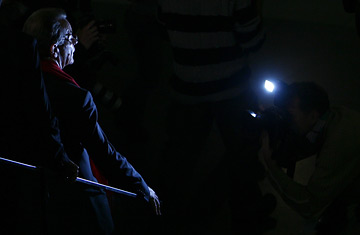
German Vice Chancellor and Labor Minister Franz Muentefering leaves a news conference after announcing his resignation to look after his seriously ill wife.
The resignation of Franz Müntefering, Germany's cigarillo-smoking Vice Chancellor, came with characteristic abruptness. Even his colleagues in the Social Democratic Party, or SPD, were surprised by the single line announcement released by the former union leader's office. Müntefering, 67, stressed that he was stepping down from Germany's second most powerful position for personal reasons, notably a "new, dramatic situation" regarding the health of his wife, who has cancer. His departure engendered great sympathy, of course — but also plenty of questions, for it comes after months of speculation about whether he would stay on in Germany's increasingly parlous grand coalition.
Müntefering had recently quarreled with Chancellor Angela Merkel over her refusal to introduce a minimum wage; he had also tussled with his own party's left wing over government plans to roll back welfare reforms introduced under the previous SPD-led government. But already questions have shifted from what engendered Müntefering's departure to what it could mean for the future: a leftward shift in the SPD, the end of any meaningful economic reforms for the current German government, and possibly the opening salvo in elections expected in 2009.
Müntefering was a key figure of compromise in Germany's ruling partnership between Merkel's center right Christian Democratic Union and the SPD, the two "volksparteien" that have ruled Germany in coalition since 2005. He may be best known outside Germany for his disparaging remarks in 2005 comparing hedge funds to "locusts" that descend on a country and strip it bare (a comment of which he remained proud, keeping a statue of the insect on his desk). But Müntefering was in fact a more centrist figure than many of his party colleagues. Newspapers referred to him as the "keystone" on which the grand coalition rested and the "hinge" binding the partnership together.
In recent months, Müntefering had been pushing hard to preserve cost-saving measures introduced by the previous government against pressure from his own party to increase government spending. His resignation came shortly after he failed in coalition talks to prevent the government from rolling back a reform that had been credited with reducing unemployment. Despite occasional disagreements and opposing party affiliations, Müntefering generally got along well with Angela Merkel, despite their opposing party affiliations. His replacement as Vice Chancellor, Frank-Walter Steinmeier, who will retain his current post as foreign minister, has a more arm's-length relationship with the CDU Chancellor. The two recently disagreed openly on policy towards China and Russia.
Analysts in Berlin said that Müntefering's departure will make it more difficult for Merkel's CDU to find common ground with its governing partners. The SPD has suffered more than its conservative partner as a result of the partnership, seeing its support sink even as Merkel's personal popularity has risen. In an attempt to win back voters, the SPD 's party chief Kurt Beck moved the party towards the left, arguing, for example, for increases in welfare spending — over Müntefering's strenuous objections. Business leaders in Germany have also complained that the government is giving up on the kinds of reforms they say are still required for Germany's economic revival.
With Müntefering gone, Steinmeier, Beck and Merkel herself are expected to pay more attention to the coming elections than to securing Germany's economic well-being. "With this event, the centrifugal forces that will tear this coalition apart have come into full view," wrote the left-wing Berlin daily Tageszeitung. "Müntefering's retreat from politics is coming at a particularly bad time," added Die Welt, a center-right daily. "Müntefering was the most effective anchor keeping the SPD from drifting to the left. Now the Grand Coalition will no longer concentrate on their similarities but on the election campaign." The government, of course, will continue to govern. But the best chances for agreement on important economic issues may have left the room with Franz Müntefering.
With reporting by Stephanie Kirchner/Berlin
